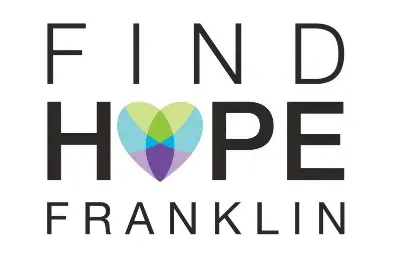Service Time: 10:30 am
Main Menu
Want to talk to someone about mental health for you or a loved one? Click the button below and a member of our team will get in touch with you.


If you or someone you know is facing depression, anxiety, grief, addiction or thoughts of suicide, Find Hope Franklin can connect you to the help you need.
Mental health issues can touch all of us, even in Franklin. Find Hope Franklin is a community-based resource with a mission to reduce the stigma associated with mental health and create an environment where anyone can feel empowered to ask for help. When individuals and families can access supportive resources, it improves the overall wellness of our community.
Messages and Further Resources
Suicide Prevention: What To Do
What To Do if someone is displaying signs
Warning Signs of Suicide
Things To Know
A suicidal person may not ask for help, but that doesn’t mean help isn’t wanted.